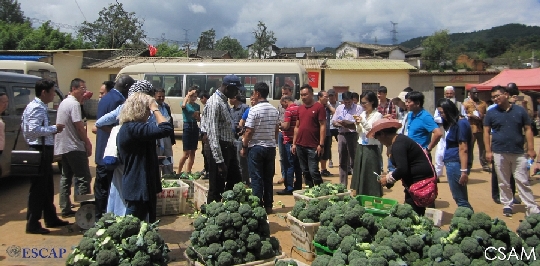United Nations Seminar Boosts Cooperation to Help Smallholder Farmers in Asia and Africa Fight Climate Change

Kunming, 20 September 2017 – Representatives of United Nations agencies, officials from national and Yunnan provincial government institutions in China, researchers, and delegates from 12 Asian and African countries have urged greater South-South Cooperation to assist smallholder farmers to combat the adverse impacts of climate change.
Smallholders in developing and least developed countries frequently suffer from food insecurity and income instability while being constrained by low affordability of inputs and limited knowledge of coping strategies. Strengthening their resilience to climate change is critical not just for development of the agricultural sector but for fulfilling the pledge to ‘leave no one behind’ embodied in the 2030 Agenda for Sustainable Development adopted by the global community.
Over 40 participants reviewed relevant national policy and strategy developments and shared practical experiences, including a range of innovative technologies and good practices from China, during the ‘Seminar on Building Smallholder Farmers’ Resilience under Climate Change through Value Chain Management’ organized in Kunming, Yunan Province, China, from 18 to 20 September. The seminar also discussed common constraints and challenges and identified priority areas for partnership and collaboration.
In his opening remarks, Mr. Tang Shengyao, Deputy Director General, Department of International Cooperation, Ministry of Agriculture of China, said, “Climate change is a common challenge. The Government of the People’s Republic of China will work together with the international community for better management and solutions for agricultural production to combat climate change, and for doing our part in context of the 2030 Agenda for Sustainable Development.”
“Development of all segments of the agricultural value chain, with a focus on the needs of smallholders, is essential for alleviating poverty and ensuring food security under the scenario of climate change,” said Mr. Sixi Qu, Representative of the World Food Programme (WFP) China Office. “This seminar is a good example of a fruitful partnership between United Nations agencies towards this goal and we are looking forward to a strong partnership and support from participating entities under the framework of South-South cooperation,” he added.
Ms. Li Yutong, Head of the Centre for Sustainable Agricultural Mechanization (CSAM) of the United Nations Economic and Social Commission for Asia and the Pacific (ESCAP), underscored that strengthening the resilience of smallholders to climate change is critical not just for development of the agricultural sector but for achievement of the 2030 Agenda.
“Given the magnitude of the challenge for strengthening the resilience of smallholders, effective cooperation between countries and between all stakeholders including government, academia, civil society, United Nations entities, other international organizations and the private sector is imperative. There is a pressing need to promote South-South cooperation in order to identify practical solutions to shared constraints, upscale best practices, promote better value chain management, and synergize the use of material as well as knowledge resources,” said Ms. Yutong.
The seminar was co-organized by the WFP China Office and CSAM with the support from the Ministry of Agriculture of China and the Yunnan Provincial Department of Agriculture. The outcomes of the seminar will be taken up for integration into the ongoing activities of WFP China Office, CSAM and other stakeholders and will be used as a basis for programmatic fine-tuning and reorientation.
NOTES TO EDITORS:
About the Centre for Sustainable Agricultural Mechanization (CSAM)
CSAM is a regional institution of the United Nations Economic and Social Commission for Asia and the Pacific (ESCAP). CSAM supports the efforts of its member States towards sustainable agricultural mechanization to contribute to the attainment of the Sustainable Development Goals in the Asia-Pacific region. CSAM's work promotes policy dialogue, setting of testing standards and protocols, information exchange, facilitation of regional agro-business and trade, and related capacity building in the region.
For more information on CSAM: www.un-csam.org
Follow us on Facebook: https://www.facebook.com/CSAMBeijing/
About the World Food Programme (WFP)
WFP is the world's largest humanitarian agency fighting hunger worldwide, delivering food assistance in emergencies and working with communities to improve nutrition and build resilience. Each year, WFP assists some 80 million people in around 80 countries.
Follow us on Twitter @WFP_Media and on Weibo and Wechat: @联合国世界粮食计划署
For media enquiries, please contact:
Anshuman Varma, Programme Officer/CSAM/ P.R. China
T: +86 10 82253579/ E-mail: varmaa@un-csam.org
Yiwen Zhang, WFP/P.R. China
T: +86 10 8532 5228 ext.5309 / Email: yiwen.zhang@wfp.org
